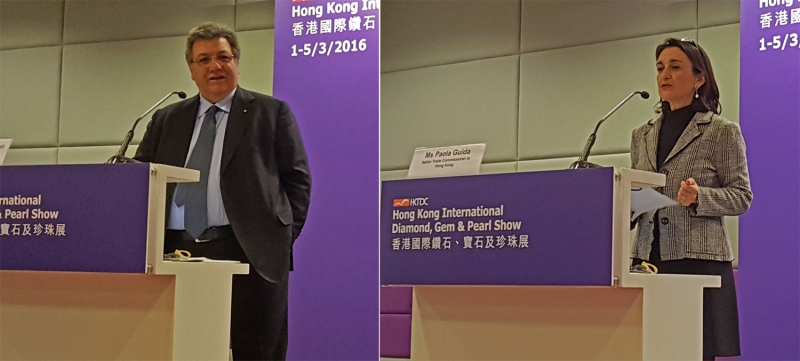Responsible environmental practices in coral and pearl sectors is the focus of a CIBJO seminar in Hong Kong

ABOVE: Gaetano Cavalieri (left), CIBJO President, and Paola Guida, the Italian Trade Commissioner in Hong Kong, welcoming participants to the seminar that addressed responsible environmental practices in the coral and pearl sectors.
MARCH 2, 2016
The implementation of environmentally sound practices in both the coral harvesting and pearl farming sectors came under the spotlight today at the Hong Kong International Diamond, Gem & Jewellery Show, with the discussion focusing not only the means to protect the fragile marine ecosystem, but also the need to present the members of the industry as responsible corporate citizens.
The seminar was sponsored by CIBJO, in conjunction with the Italian Trade Commission. As world leaders in the design and manufacture of both pearl and coral jewellery, Italians have stood at the forefront in the research and development of environmentally responsible pearl farming and coral harvesting methods.
“The long-term viability of both the pearl and coral sectors in the jewellery industry is dependent on the development and implementation of responsible practices, which both protect and facilitate the renewal of a bio-diverse marine environment, promoting higher quality and more sustainable resources,” said CIBJO President Gaetano Cavalieri. “Our efforts in this respect are part of a comprehensive program to promote sustainable environmental policies in the sector, which also includes the CIBJO Jewellery Industry Greenhouse Gas Measurement Initiative promoting carbon footprint and offsetting, through the purchase of carbon credits.”
Greeting participants in the seminar was Paola Guida, the Italian Trade Commissioner in Hong Kong, who noted that the event underscored the Italian jewellery industry’s commitment to ethical and sustainable environmental practices.
In addition to Dr Cavalieri and Ms. Guida, the panel of speakers at the seminar included:
- Enzo Liverino, President of the CIBJO Coral Commission, who provided an overview of corporate social responsibility and sustainable marine practices in the coral industry.
- Laurent Cartier, Project Manager at the Swiss Gemmological Institute SSEF, who provided an overview of corporate social responsibility and sustainable marine practices in the pearl industry.
- Russell Hanigan, from the Paspaley Pearling Company, who described pearl farming practices off the north-western coast of Australia.
- Jacques Christophe Branellec, Vice President of the CIBJO Pearl Commission and Executive Vice President of Jewelmer Joaillerie, who described environmental aspects of pearl farming in the Philippines.
- George Lu, Vice President of the CIBJO Coral Commission, who described environmental aspects of coral harvesting in the South Asia Seas.
- Tommaso Mazza, President of the Association for the Manufacture of Coral, Cameos and Jewellery (Assocoral) in Italy, who looked at the legal aspects of coral harvesting in the Mediterranean region.
- Dr. Cristina Del Mare, an ethnologist, orientalist and jewellery industry historian, who provided an historical perspective of coral harvesting in the Mediterranean.
In his presentation, Mr Liverino highlighted the ratification in 2015 of CIBJO’s Coral Blue Book, which is the latest addition to the organisation’s sets of industry standards and nomenclature, joining Blue Books dedicated to diamonds, coloured gemstones, pearls, precious metals and gemmological laboratories.
The ultimate aim of the Blue Book of Coral is to protect consumers’ confidence in the coral industry through careful and documented definitions, clauses and rules, Mr Liverino said. “The stability in any jewellery market depends up on the use of the proper nomenclature and the declaration of all known facts, to ensure a fully informed purchase or sale throughout the distribution pipeline, all the way to the final consumer,” he stated.
